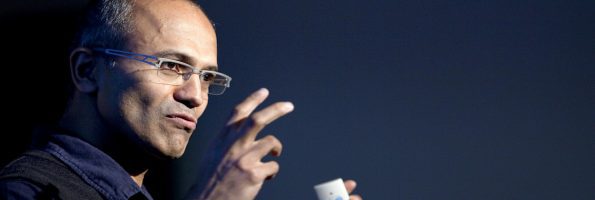Bloomberg Ranks Ted Rogers MBA Among World’s Best

Just a few weeks after Bloomberg Businessweek debuted its list of the top U.S. MBA programs for 2017, the publication revealed its ranking for the best international schools, with the Ted Rogers School of Management at Ryerson University being lauded as not only one of the best schools in Canada, but one of the best in the world.
The Bloomberg Businessweek ranking looks at factors such as the success rates of alumni in starting careers, starting wages, and surveys from recruiters, current students, and graduates of the program.
This marked the first time the Bloomberg Businessweek ranking has featured the Ted Rogers MBA, but the program’s success has not gone unnoticed, especially in Canada. The school is also regarded as one of the 100 best MBA programs in the world by The Economist and by the Canadian Business’ Top 10 Canadian MBA programs four years in a row. The program also placed in the top ten this year among the Bloomberg‘s ranking of top salaries and job placement for recent graduates.
Since its creation in 2006, the Ted Rogers MBA has been highly regarded for its innovative approach to business education and location at the center of Toronto’s business district. “From the beginning the Ted Rogers MBA benefitted from strong leadership, a commitment to excellence, and a focus on students’ careers,” Ted Rogers MBA Director Kim Bates said in a press release following the release of the annual ranking.
“As a startup program, we were able to configure our programs to reflect the new century and differentiate from our established competitors,” she adds. “Our career results are excellent, program delivery and commitment of faculty and staff are exceptional, and we have had support from our academic leadership to admit only high-quality students.”
French business school INSEAD led the way in this year’s ranking, taking over for the London Business School (LBS), which swapped the number one and two spots from last year. Ted Rogers, 24th overall, was one of five Canadian business schools to land on the list, with the Ivey Business School at Western University Canada earning the highest ranking among the group—11th overall.
Check out the entire 2017 Bloomberg Businessweek international MBA ranking here.
Merage School of Business MBA Earns Praise From The Economist

The UC Irvine’s Merage School of Business received some good news after the school was ranked in latest business school rankings of The Economist. The school placed 39th in the nation, 16th among public schools, and 56th in the world. The Los Angeles metro business school also scored well in categories including 29th in Open New Career Opportunities; 17th in alumnus rating of career services; and 13th in salary increase.
Continue reading…
Alumni Spotlight: Microsoft CEO Satya Nadella – University of Chicago Booth School of Business

Once a ferocious beast in the kingdom of tech with massive product launches and Antitrust sagas, it could be argued that Microsoft has spent the first two decades of the 21st century in search of solid ground. The Steve Balmer era, which focused on “devices and services,” brought us the Xbox, the Surface, and the acquisitions of Skype and Linkedin. Wired posits that the fall of Microsoft “stems from its attempts to lock users into its products by refusing to work with competitors,” coupled with a series of “me-too hardware products,” like the Zune and the Kin. There’s also Bing and MSN, which are practically non-entities compared to their competition.
In the last three years, CEO Satya Nadella has been a relevatory savior for the company, spearheading a massive pivot away away from hardware and toward cloud computing and AI. So far, so good. Company shares reached record highs since 1999 and its cloud is valued at a $14 billion annual run rate, which places Microsoft neck and neck with Amazon Web Services, if you include Microsoft Office 365. That said, Nadella remains unphased by the numbers, as he tells the Economist, “When you have a core that’s growing at more than 20 percent, that is when the rot really sets in.”
Let’s take a deeper dive to find out more about Nadella’s past, present, and future.
Learning at Chicago Booth
Nadella’s tenure at Microsoft is inextricably linked with his University of Chicago Booth School of Business education. In fact he started both at the exact same time, in 1992. Instead of opting out of one for the other, he enrolled in Booth’s Weekend MBA program and flew from Seattle to Chicago every weekend for two-and-a-half years.
Nadella believes his Booth MBA was instrumental in giving him the “knowledge and confidence to tackle complex questions at the intersection of business and technology,” according to a UChicago profile. Nadella cites Steven Kaplan’s entrepreneurial finance class as particularly influential on his ability to “evaluate new business opportunities at Microsoft.” On Nadella, Kaplan spoke highly: “He can take a situation and analyze and articulate the issues involved. He can both write well and understand the case quantitatively.”
Wired traces Nadella’s “clarity of vision and empathetic listening style” to his firstborn son Zain’s cerebral palsy, which helped Nadella “see beyond himself and compelled him to force-rank his daily priorities so that he could meet his son’s needs and still perform his job—the same skill so necessary to effective management.” He tells Wired:
“I think back to how I thought about work before and after, and this notion of the words you say and what they can do to the other person. How can you really change the energy around you? It’s a thing that started building in me, and I started exercising it in my day job. It made a lot of difference to how I felt when I went back home. So much of it is mental attitude.”
Early Days at Microsoft
In 2015, Nadella told UChicago Booth Magazine, “Having grown up in the company, what is it 23 years or so, I always come back to the very first thing Microsoft did, the BASIC interpreter. It was this notion of empowering others to do great things.”
Nadella progressed quickly through company ranks. His first major notch on his belt was Windows NT but played significant technical roles in Bing, MSN, and Microsoft’s advertising systems. UChicago Booth Magazine pinpoints Nadella’s real contribution to the company during his tenure of Executive VP of cloud and enterprise businesses.
“At Microsoft, Nadella is navigating a rapidly shifting technology landscape, in which customers have been moving away from traditional desktop computers, toward nimbler mobile platforms such as tablets and smartphones.” Nadella says, “The only way you’re going to have that mobility of the human experience—not the device—is by having cloud orchestrate the movement.”
CEO
When the Nadella era began, he publicly invoked Nietzsche when he said Microsoft must have “courage in the face of reality,” according to Wired. His approach to steering Microsoft is nothing if not rooted in reality. Wired compared his Microsoft strategy to those of “the Silicon Valley startups that have eclipsed it” in which the change is cultural, not just organizational. The Economist writes that Microsoft is much more of a “full stack” firm, in which it “not only writes all kinds of software, but builds its own data centers and designs its own hardware.”
Nadella tells UChicago Booth Magazine, “My vision is to take that productivity and empowerment of individuals and organizations and express it in this new world, which is mobile-first, cloud-first.”
Nadella jettisoned the company’s R&D process in favor of a more transparent, open-ended model, which is perhaps in response to such New Coke-style abominations as the Microsoft Courier. He encourages execs to work with people outside their divisions, whose lines of demarcation have become increasingly ambiguous.
He’s pushing engineers and researchers from disparate parts of Microsoft to work more closely together—even wrangling Bill Gates back into the saddle as a part-time technical adviser to motivate his team. “When I say, ‘Hey, I want you to go run this by Bill,’ I know they’re going to do their best job prepping for it,” he tells Wired. Nadella described Microsoft’s Skype Translator, which offers real-time translation of multilingual chats, as the apotheosis of his cooperative company-wide strategy.
The Future
Nadella tells UChicago Booth that his overarching vision for Microsoft is to adapt to the dialogue between culture and technology but to push for a more productive, harmonious conversation. In March, Nadella shared his vision for a new “platform-neutral” Microsoft with the announcement that the company would soon launch Word, Excel, and PowerPoint editions for the iPad.
“Technology has always led us to have better lives [but] you can measure whether you’re doing anything useful. Do you feel a little stretched? If not, there’s something wrong.”
The Best Executive MBAs in Atlanta

The city of Atlanta might just become the next hot spot for business. The southern city’s population increased by more than 90,000 last year, and it’s likely to grow even more. Right now, it’s the ninth-largest metro statistical area in the country—clinging to the top 10 in the U.S.
This influx of people has followed the city’s booming job market. That and the warmth that comes with living in the great state of Georgia. The cost of living in Atlanta is also affordable, especially when looking at other major metros along the East Coast. The city was ranked among the 12 “best big cities” to live and the median annual salary is $48,750.
This might just make Atlanta the next best place to build on already-established experience to pursue an executive MBA. Here are five of the best programs in the city.
The Best Atlanta Executive MBA Program Options
Goizueta Business School – Emory University
Emory University’s Goizueta Business School has been around for a while, since 1919. That’s nearly 100 years. It’s no wonder that its executive MBA program offers all the perks it does. The school’s had time to finesse its programs. The school sits on Emory University’s campus within driving distance from downtown.
The Executive MBA program at Goizueta caters to the older professional who needs flexibility. That’s why the program has two tracks: one on the weekend and a modular EMBA. The modular EMBA allows students to finish the program in 20 months. That’s not even two years. Either way, students begin the program in September. The weekend MBA offers five areas of focus: finance, healthcare, leadership, strategy, and general management.
J. Mack Robinson College of Business – Georgia State University
If you’re looking for hustle and bustle, the J. Mack Robinson College of Business at Georgia State University might be it. Located downtown, the school’s been around six years longer than Goizueta. So it’s way past the century mark.
The Executive MBA program is short, too. It takes just 17 months to complete. Classes take place every other weekend. Most students are around 40-years old. This Atlanta EMBA program has received rank after rank from publications like U.S. News World & Report, CEO Magazine, and Ivey Exec.
Scheller College of Business – Georgia Institute of Technology
At the Scheller College of Business at the Georgia Institute of Technology, MBA candidates can expect a lot of immersion into the world of business. The school sits smack dab in Midtown Atlanta, the city’s second largest business district.
MBA students can decide to focus on one of two options: global business or management of technology. The Executive MBA program has a heavy foundation focused on the basics of business, but it also compounds that with a required international residency.
Terry College of Business – University of Georgia
Sitting on the University of Georgia’s Atlanta campus, the Terry College of Business‘ Executive MBA program is worth keeping your eyes on. Students do have to complete two week-long residencies at the school’s Athens campus, but it’ll be worth it.
With a professional executive mentor, students get direct access to the business world from someone who knows how to navigate it. The Executive MBA program has been ranked 14th in the world by The Economist. It combines classroom education with field experience—all in 18 months.
Michael J. Coles College of Business – Kennesaw State University
The Michael J. Coles College of Business at Kennesaw State University sits outside the city of Atlanta, but it’s still very close. Located in Kennesaw, Georgia, the school hasn’t been around as long as others on this list. But that doesn’t make it any less competitive.
For one weekend a month over 17 months, students learn real-world experience to give their years of experience even more edge. The program is proud of what it can offer students interested in expanding more globally. The eight month-long additional global program provides students a 10-day international residency, as well as working with another MBA program in Europe.
What are the Most Common Business School Application Mistakes?

Nobody just strolls into business school and starts taking classes. Prospective MBAs must undergo a rigorous application and admission process before beginning coursework and earning credits toward an graduate degree. Continue reading…
Searching for the Perfect 1-Year MBA in Boston

Not everyone has two years to dedicate toward earning an MBA. For some, maybe a year is just a better option. Luckily, Boston has more than enough options for those who would rather trek down the one-year path.
Currently, Boston is the 20th most populous city in the U.S., with its historical roots grounded in advanced academia. It has proven to be a perfect home for students, with a population that skews young. Almost one out of every three residents is between the ages of 20 and 34.
The largest employers might be hospitals like Brigham & Women’s Hospital or Massachusetts General Hospital, but the coastal city’s true jewels are its universities like Harvard and MIT. While most schools in the area offer MBA programs, not all offer options that’ll allow students to graduate with an MBA within one year. Below, we outlined some of the best Boston 1 Year MBA program opportunities.
F.W. Olin Graduate School of Business — Babson College
The F.W. Olin Graduate School of Business isn’t too old; it’s been around since 1947. Students can take its one-year MBA program on its main campus in Wellesley, Massachusetts. It’s about 14 miles away from Boston, so students will still be just a short drive away.
The program takes 12 months, but students can build close bonds with each other in this short period of time. This program’s participants operate as a cohort, but they also get the chance to mingle with some students in the school’s two-year and evening MBA programs. All MBA candidates have the opportunity to participate in Signature Learning Experiences, a hands-on approach to education that prepares students for real-world situations.
Sawyer Business School — Suffolk University
The Sawyer Business School isn’t as old as the university, but that hasn’t stopped it from getting recognized. The school began to offer an MBA in 1948 and never quite began to offer a formal one-year MBA program, but it does offer accelerated ones.
Sawyer has a couple accelerated MBA programs: one for attorneys and for certified public accountants. The way it works is that students enter the program with credits already under their wing. The catch is that students complete a certain number of credits in the business school—but these could have been before chasing an MBA. It all really depends. That’s 37 credits for attorneys; 34 for CPAs.
MBA candidates with an interest in law can also learn a concentration while at the school. Courses include an immersive, travel seminar. As for CPA candidates, their curriculum is nearly identical to the attorney pathway. The only difference is one class required for the attorney curriculum and not the CPA: Corporate Financial Reporting and Control.
Sloan School of Management — MIT
MIT may mostly be known for tech industry and Good Will Hunting scenes, but its Sloan School of Management is frequently ranked as one of the best in the world by esteemed publications like The Economist. While Sloan doesn’t exactly offer a one-year MBA, its MIT Sloan Fellows Program only takes one year—and fellows walk away with an MBA.
The school calls the program a “change-the-world toolkit.” Mid-career managers from around the world are invited to apply for the fellowship. Once accepted, fellows arrive in April and begin their journey together. They take summer courses, fall courses, and some during the spring too. There’s an optional independent activities period where fellows can take part in a four-week term made up of how-to sessions, forums, or tours for 12 credits max.
